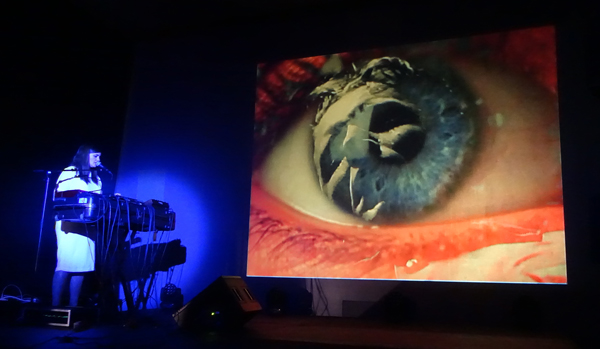In his 2011 book Normal Life, law professor and trans-activist Dean Spade writes of the wide-ranging goals of trans-resistance, a political awakening that fights against such manifold systems of domination that its practitioners cannot focus unilaterally on sex, gender, race, class, disability, or queerness, but must take as their object the liberation of all subjected people: “[This resistance] is rooted in a shared imagination of a world without imprisonment, colonialism, immigration enforcement, sexual violence, or wealth disparity,” Spade writes. “It is sustained by a social movement infrastructure that is democratic, non-hierarchical, and centered in healing.”
At the Broad Museum’s fourth and ultimate Summer Nonobject(ive) Happening, which took place last Saturday, visitors witnessed the sensational expression of this vision in art.

Sophie
At 9:30 p.m., the poltergeist-voiced Elysia Crampton took the stage in the Broad’s intimate Oculus Hall, and challenged her rapt audience with a Spade-like apparition of a carceral globe that imprisons trans-Latinas, Earth’s delicate ecology, and historical and contemporary targets of colonialism and genocide. Crampton conveyed her vast revelation through crashing musical riffs, which she combined with spoken word and a video compilation. Her visuals began with the image of the universe’s fiery birth, down over which slammed prison bars. They continued with footage of Latin American women protesting transfobia, a scary-looking Satan with flapping wings, beautiful mountains, witch trials, the murdered 18th-century Aymaran freedom fighter Bartolina Sisa, and ended with footage of two merging black holes that explode in a galactic cataclysm.
The Bolivian-American Crampton dominated the stage in a glamorous purple dress and a Valkyrie wail as she screamed out a call for the “dissolution of the sovereign” and recited a stammering list of nightmares that arrive with oppression— “Tendons peel off/Trash/Nobody/Hacked Body” —while her smashing beats invaded audience members’ chests so that you felt like you were having a heart attack. “Now is the time to resist, to fight for your continuation,” she commanded, her hair streaming down her shoulders and her face bathed in sweat and klieg lights. “The engine of change is now, it will be the impulse to change the world.”
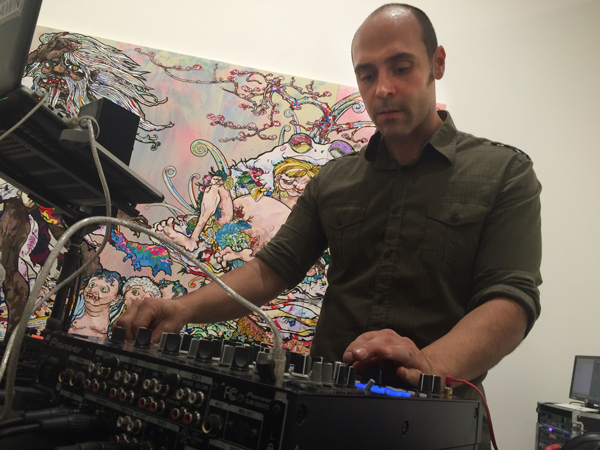
Kid606
Broad Happeners staggered out from the Oculus’s dark womb and into the fairy-lit city of its plaza, unsure how to shake off the distressingly mingled sensations of doom and panic. The evening had started calmly enough, with a lovely EDM DJ concert put on by JD Samson, a genderqueer class critic and musician formerly of Le Tigre and one of the leaders of In Men. But Crampton had raised the emotional stakes, and as we ran up to the third floor of the museum to watch Kid606 put on a show of ambient techno amid Jeff Koons’ delicate-looking, $33 million dollar sculpture Tulips (1995-2004) and Takashi Murakami’s phantasmagorical mural In the Land of the Dead, Stepping on the Tail of a Rainbow (2014), it proved difficult to dial back to a state of head-bopping enjoyment. Also, it’s hard to dance very ecstatically when you’re worried you’re going to break and be sued for damaging art that literally costs more than a handful of private islands.
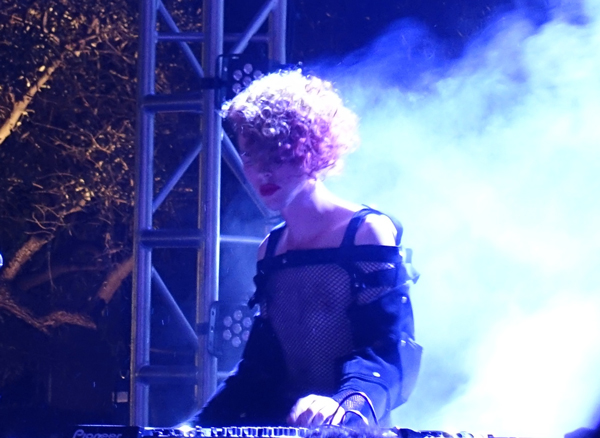
Sophie
Producer and composer Sophie next put on a charismatic concert in the plaza, where his use of contagious heartbeats and Chipmunk female vocals repeating suggestions that “we go crazy in the club” prompted the amassing crowd to woogle around gleefully. Half an hour later, transwoman Lauren Bousfield did her best to shake up the Broad’s third floor with a Wagneresque crescendo of synth cacophonies backed by hell-raising choruses that should have had us all crawling on the floor and begging for mercy—but, again, the Koons are expensive and also the lights were really bright.
The last act, however, shaped this final Happening into a circle. Each of the Happenings this summer have been enriched by trans and queer presences—we met caring Mutants at the first, the risky open heart of Brontez Purnell at the second, and the amazing Macy Rodman at the third. All of these performers brought patrons into discomfiting, dazzling mini-worlds full of possible love and deliverance.
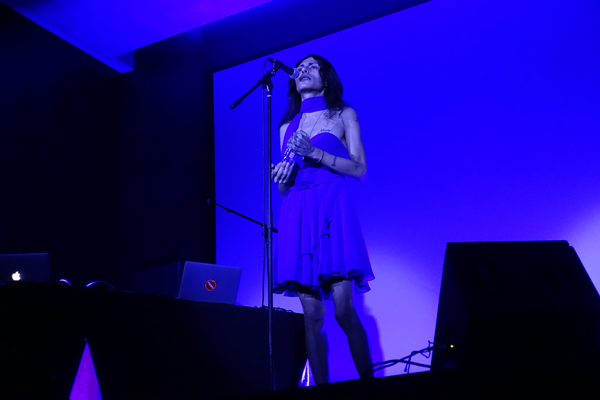
Elysia Crampton
As we entered the Oculus for the last act, we discovered the culmination of this promise. Ethereal musician Julianna Barwick stood before her synthesizer and played an accompaniment to a film created by a master documenter of queerness and dance, Charles Atlas. Atlas has been making films about these themes since he began collaborating with and shooting Merce Cunningham in the 1970s. In 2003, he revealed his communitarian commitments in his interactive work Instant Fame!, where he made video portraits of anyone who made an appointment with him. And in 2012, he released Turning, a film about “13 remarkable women,” many of them queer and trans.
Atlas’s Happening video revealed the face of a sleeping man, over which the director laid consecutive images of flying birds, a man caressing a woman’s face, a woman’s shackled hands being burned, a city backdrop, an open eye, a man falling through space, a child raising his arms, soldiers storming a hill, a beautiful girl with electrodes strapped to her head, a peaceful green planet, and joyous acrobats.
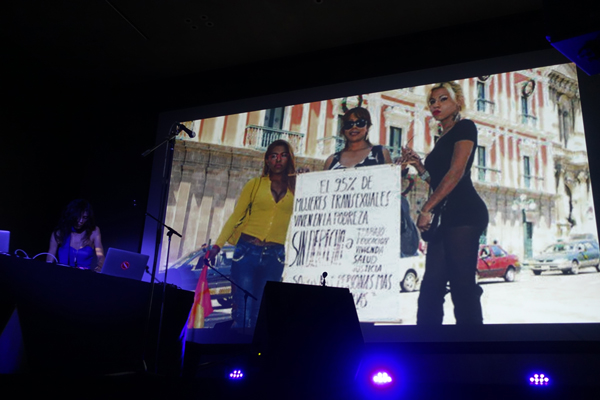
Elysia Crampton’s video
The film connected with Crampton’s in its difficult, universal acknowledgment of death and potential. But whereas Crampton’s work assaulted the viewer with a chaotic collage of darkness and indignity, Atlas’s sleeping man anchored his appeal to the idea of vulnerability. Crampton’s cacophonous work constituted a 911 call about soul-murder, and Atlas and Barwick together graced their audience with the possibilities of human union and tenderness.
In this way, the three artists realized the enormity of Dean Spade’s conception of trans-resistance as struggle against hurt and suffering. This goal requires that we acknowledge both the unspeakable and unsurvivable at the same time that we reach out to each other with gestures of beauty and empathy. Together, these legal and artistic strategies are democratic, non-hierarchical, and centered in healing. They offer a touchstone for action and understanding.
The Broad’s Nonobject(ive) Summer Happenings are over. Long live the Broad’s Nonobject(ive) Summer Happenings.
Photos by Chris Jarvis
Additional Research by Jenny Jarvis

